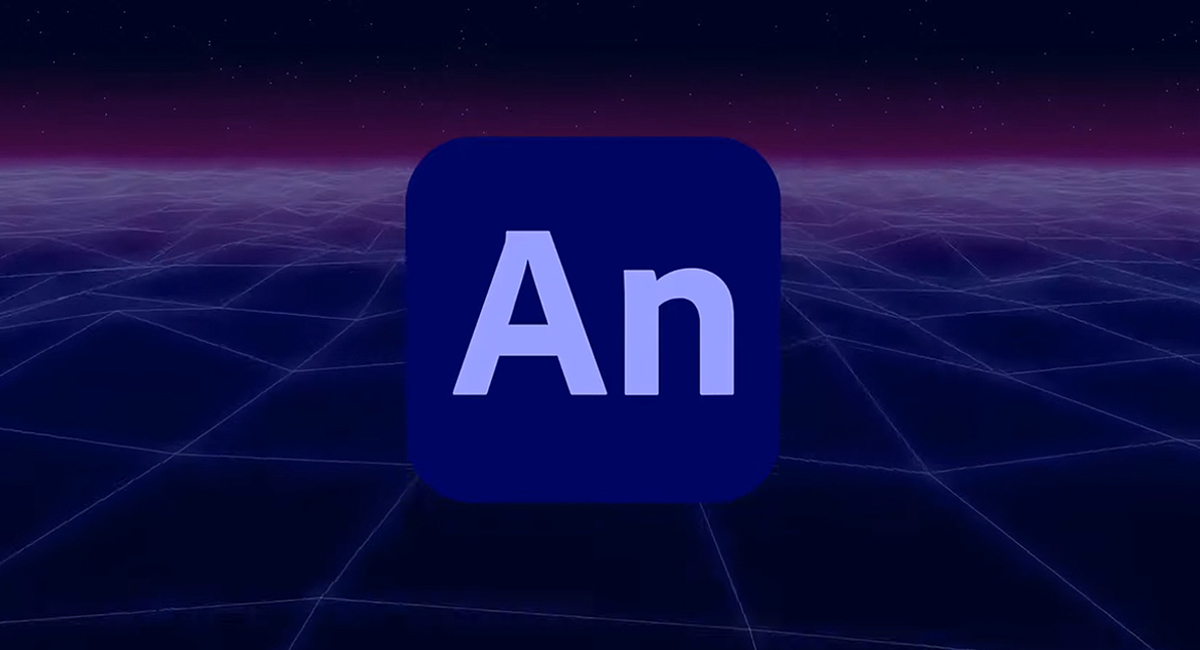INTERVIEW: Aardman director Darren Dubicki
The commercials director at Aardman Animations discusses why CGI is his favourite medium, his design for the 2012 Olympic mascot and why he'd like to find a mystery lady from his past.
Daily design news, reviews, how-tos and more, as picked by the editors.
You are now subscribed
Your newsletter sign-up was successful
Want to add more newsletters?

Five times a week
CreativeBloq
Your daily dose of creative inspiration: unmissable art, design and tech news, reviews, expert commentary and buying advice.

Once a week
By Design
The design newsletter from Creative Bloq, bringing you the latest news and inspiration from the worlds of graphic design, branding, typography and more.

Once a week
State of the Art
Our digital art newsletter is your go-to source for the latest news, trends, and inspiration from the worlds of art, illustration, 3D modelling, game design, animation, and beyond.

Seasonal (around events)
Brand Impact Awards
Make an impression. Sign up to learn more about this prestigious award scheme, which celebrates the best of branding.
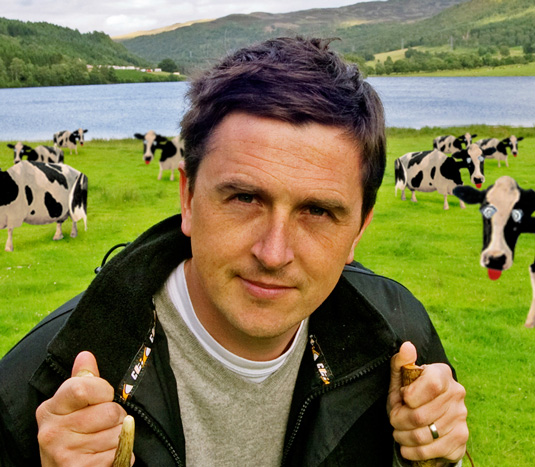
Darren Dubicki joined Aardman Animations in November 1998 as a set designer and production artist for feature films such as Chicken Run and Curse of the WereRabbit.
He's been there ever since and, after holding various roles within the company, he is now working as commercials director & senior lighting creative for the Aardman CGI department.
In this exclusive interview with Creative Bloq, Dubicki reveals how his break at Aardman came about, his inspirations and why CGI is his favourite medium. Check it out...
QUESTION: How did you start out in design?
"I studied illustration for three years at Bristol University, where I managed a lot of experimentation in traditional drawing and painting. I tried many times to get into the ‘Mac Room’ to have a go at computer design, but the graphics department constantly had their mitts on the machines."
QUESTION: What was your first design job after you graduated?
"My first commissioned work was helping to illustrate a book, The Secret Language of the Stars and Planets , along with illustrator, David Atkinson. It involved creating a series of unique maps and diagrams to illustrate a mixture of astrology, astronomy, anthropology and other strands of primitive and modern science. We had a great laugh, illustrating and listening to endless Chris Morris radio shows."
QUESTION: How did the opportunity to work for Aardman come about?
"I was creating film concept design for another animation company, Bolex Brothers. It was roughly the time when Aardman were in the early stages of development for Chicken Run.
I was bought in to work on some visual development for Chicken Run
"The producers at Bolex recommended me to Aardman, and I was bought in to work on some visual development for the film. I then became part of the art department and it took off from there."
Daily design news, reviews, how-tos and more, as picked by the editors.
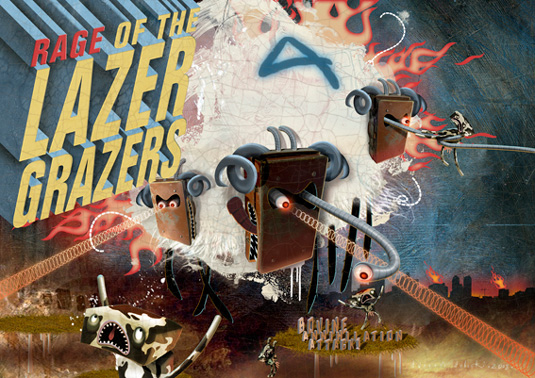
QUESTION: Having worked across many different areas of media during your career, which is your favourite and why?
"That’s hard to nail down as each area has its own scale, challenges and rewards. I do feel lucky that as a designer and director, I have the opportunity to move between TV, commercials, short films and all the various formats: it helps to maintain a momentum and freshness in my work. But if I had to narrow it down, then commercials would take the lead as I prefer to have as much variety and diverse projects come my way as possible."
QUESTION: What work are you most proud of to date?
"I’m probably most proud of the work I’ve done for E4 and Channel 4 in the past. Most of the spots were created on a shoestring, but armed with very keen artists with an appetite for inventiveness, we managed to create some films with decent production value. For one series, I shot live action in my back garden to create a ‘jungle’, using a kid’s toy trolley as a camera dolly, candles, a can of smoke and fishing wire to move plant leaves. Simple thinking but effective."
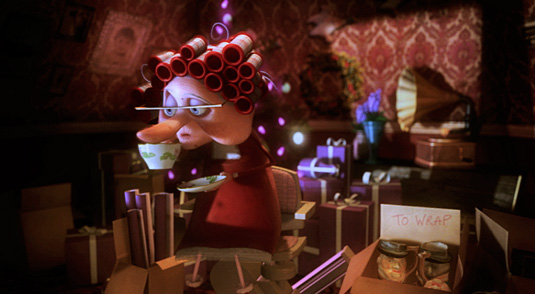
QUESTION: You've worked with many talented people. Is there anyone you haven't worked with yet but would like to?
"Too many to mention. I’m a fan of Kurt Jackson, a remarkable landscape painter whose paintings have an immense energy and dynamism. To see his images taken into the animation world could be potentially exciting."
QUESTION: What's your favourite tool? Do you prefer traditional or digital methods?
"I do miss getting messy, I used to make a right mess when I worked traditionally but now that’s been scaled back. But I still mix it up and create work that’s a combination of traditional and digital. Drawings and hand painted textures go through the scan process and get logged into a database of reference material.
I still mix it up and create work that's a combination of traditional and digital
"Over the years, I’ve pretty much managed to recreate my traditional working process in Photoshop… so now I’m not surrounded by piles of scrap paper. Well, sort of.
"Depending on whether it’s design work or animation, I’d generally be using Photoshop on an industrial scale, along with many other software packages. But it all begins with a pencil."
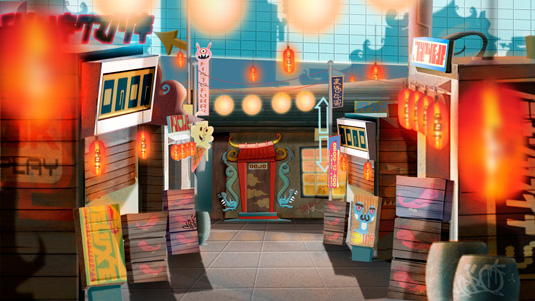
QUESTION: What are you main sources of inspiration?
"Comedy. Randomness. The absurd. Collections - I don’t like to collect things as such, but I’d rather marvel at other people’s need to accumulate. I’m also enthused by absurd inventions, vintage ads, satire, my kids, my contemporaries and music."
QUESTION: If you could speak to one person, who would it be, what would you say and why?
"I would love to find and speak to the woman who, when I was around eight years old, came into my primary school and started talking to me about my drawing.
Her kindness had a profound impact on my life
"I remember it vividly; it was a dragon. I had no idea who she was and can’t remember what she said to me but a few days later she returned and handed me a large box of drawing materials and paper. So, I would ask her what prompted her to give so generously, and then I’d let her know that her kindness potentially had a profound impact on my life."
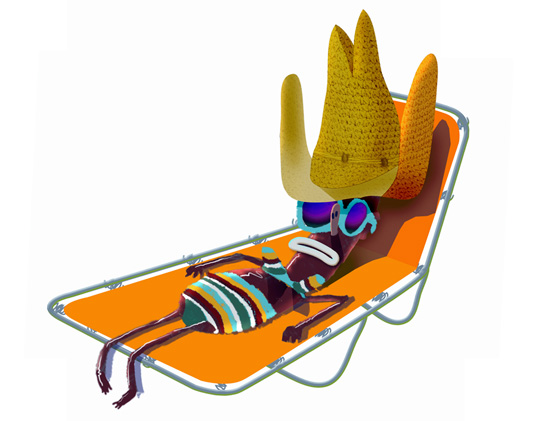
Next: Olympic mascots, children's illustrations and more...

The Creative Bloq team is made up of a group of art and design enthusiasts, and has changed and evolved since Creative Bloq began back in 2012. The current website team consists of eight full-time members of staff: Editor Georgia Coggan, Deputy Editor Rosie Hilder, Ecommerce Editor Beren Neale, Senior News Editor Daniel Piper, Editor, Digital Art and 3D Ian Dean, Tech Reviews Editor Erlingur Einarsson, Ecommerce Writer Beth Nicholls and Staff Writer Natalie Fear, as well as a roster of freelancers from around the world. The ImagineFX magazine team also pitch in, ensuring that content from leading digital art publication ImagineFX is represented on Creative Bloq.
